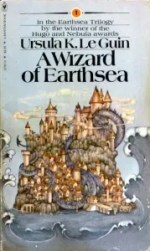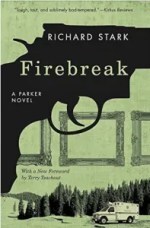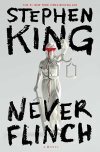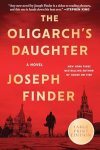Brevity and Velocity
Rob Kelley here, musing this week on short books that pack a punch.
One of the things I really like about The Writer’s Hotel writing conference is the “Major Workshop,” a critique and craft group led by a senior writer. I was lucky enough to be in one led by Jeffrey Ford, who is an amazing writer and a great coach. I also had the opportunity to read and be read by seven other talented writers, some published multiple times, some (like me) about to debut, and some earlier in their writing journey. Because this a conference that participants must apply for, we were guaranteed high quality engagement with fellow authors, and Jeff’s Major Workshop delivered.

It was my critique work of other authors that raised the concept of brevity. In two of my critiques I was making a point about tightening prose to move the action along, and the example that popped into my head unbidden was Ursula LeGuin’s 1968 novel A Wizard of Earthsea.
This is the cover my copy has, which is from a Bantam Books printing from 1973 (which I bought used for 75¢ at a used bookstore. Those were the days!). I probably read it for the first time in early high school in the late ’70s. I reread it multiple times in the following years then put it away as my tastes expanded and evolved. But it came to mind as I was doing my critiques as an example of a masterclass in brevity.
In 56,000 words, LeGuin builds a world, gives us its history, introduces us to a boy who grows into a man who must face the consequences of using his considerable power in a vain and foolish youthful act that threatens him and those around him. In the meantime, we learn the geography of the Earthsea archipelago (the included maps are fabulous), a bit of the old tongue that gives a wizards their power, all while following the wizard on multiple adventures to previously uncharted land. That’s a lot in 56,000 words.
How is she able to do so much in so few words? Specificity. Everything is grounded in detail. Each sentence works extra hard to build the world, set the tone, give a voice to the protagonist. Now this is fantasy novel, which has certain conventions that make this easier, but I could just as easily used as an example from the crime and thriller canon.
 That example (those examples) would be the Parker novels by Richard Stark, a.k.a. Donald E. Westlake. (Huge shoutout to fellow Maine thriller writer Chris Holm for introducing me to Parker in his “Unputdownable” master class!)
That example (those examples) would be the Parker novels by Richard Stark, a.k.a. Donald E. Westlake. (Huge shoutout to fellow Maine thriller writer Chris Holm for introducing me to Parker in his “Unputdownable” master class!)
Number 20 in the series, Firebreak, opens with what I think is the single best line in any crime fiction, anywhere:
When the phone rang, Parker was in the garage, killing a man.
Now that’s an opening. It tells you a lot about Parker, a lot about the situation we’re in, or about to be in. And in the 40,000 words that follow we get everything we expect from Parker: heists, plans gone wrong, betrayals, and revenge. Across 24 books we see a hard man do sometimes unspeakable things and we’re holding on for dear life as we follow along. Extremely brief, and again, very specific. The immediacy. The phone. The garage. The killing. Our only conclusion: it’s about to get worse.
Both LeGuin and Westlake were masterful writers, ones I try hard to emulate: the brevity, the specificity, and most importantly for thriller writers, the velocity.
What’s your favorite opening line that kicks off a real barn burner of a book?
 Currently reading: Never Flinch, Stephen King, 2025.
Currently reading: Never Flinch, Stephen King, 2025.
 Next from the TBR list: Oligarch’s Daughter, Joseph Finder, 2025.
Next from the TBR list: Oligarch’s Daughter, Joseph Finder, 2025.
Lea Wait's Blog
- Lea Wait's profile
- 506 followers



